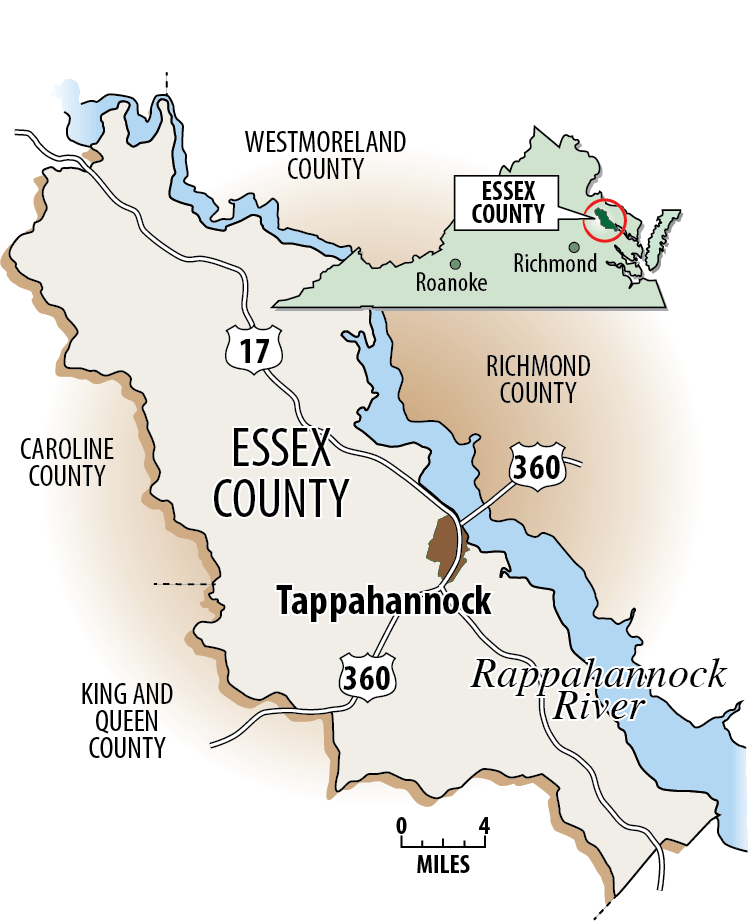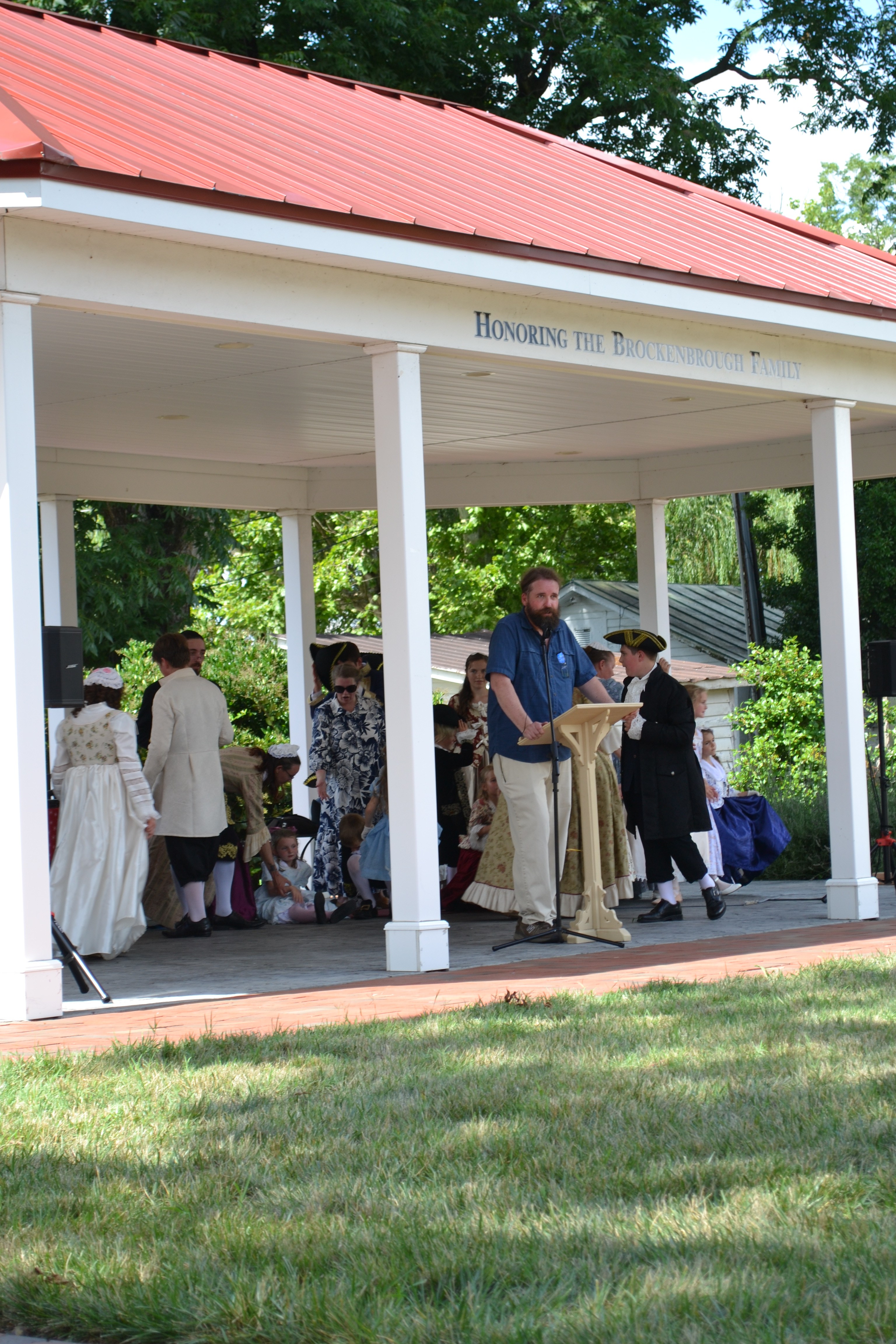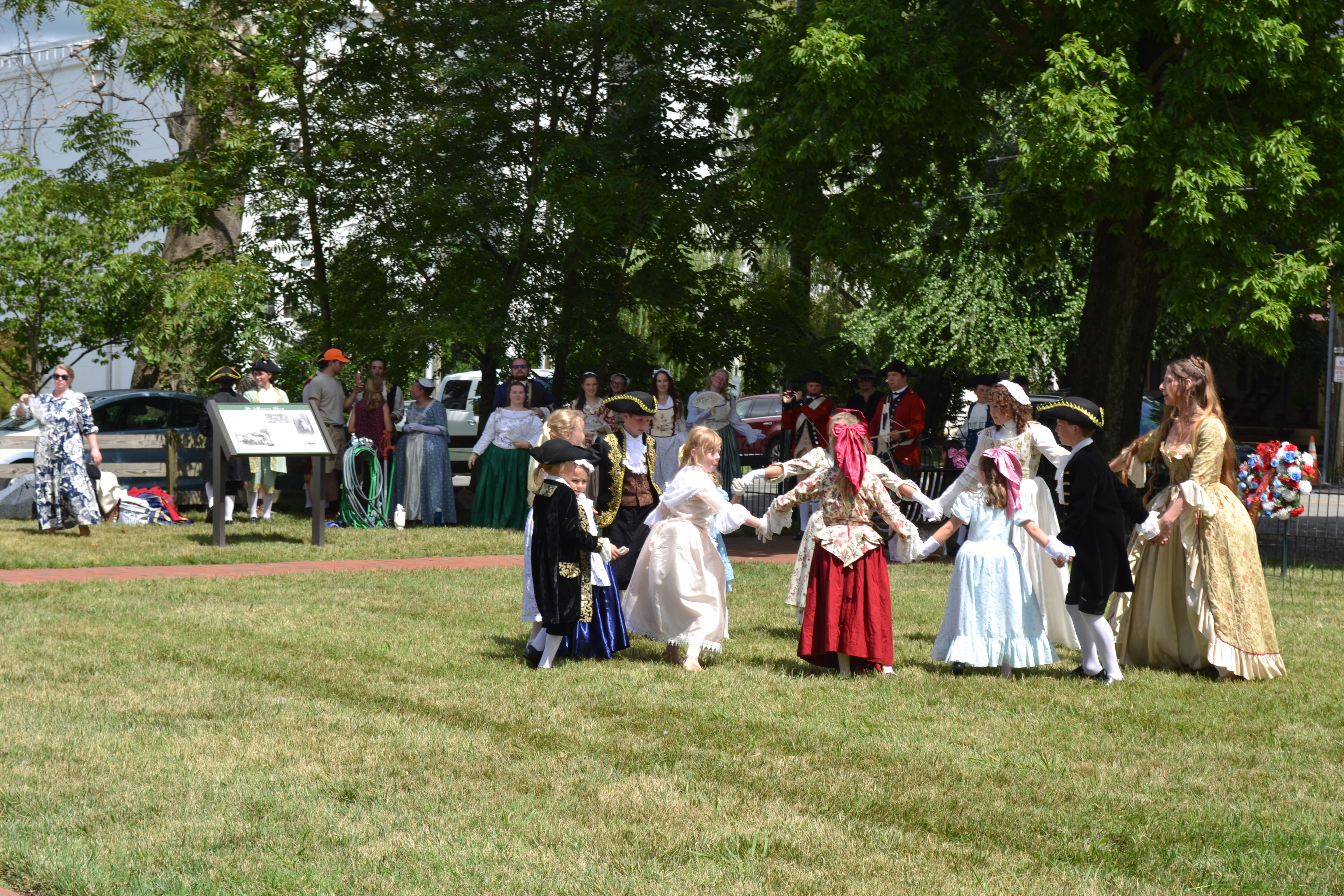The year 2026 marks the 250th anniversary of the Declaration of Independence. Cardinal News has embarked on a three-year project to tell the little-known stories of Virginia’s role in the march to independence. This project is supported, in part, by a grant from the Virginia American Revolution 250 Commission. You can sign up to receive a free monthly newsletter with updates. Find all our stories from this project on the Cardinal News 250 page.
July 1774 wasn’t so unlike July 2024 in Tappahannock. It was hot. Politics were tense. And locals gathered within view of the water to hear “The Essex Resolutions” — the 16 items Colonists listed as reasons they would not support England’s Intolerable Acts, and how they would respond.

For the 250th anniversary of the resolutions, one of 30 or more crafted by Virginia counties the summer of 1774, the Essex County Museum held an afternoon of festivities on July 13, culminating in a “Hamilton”-inspired performance of the resolutions. This project was supported, in part, by the Virginia Commission for the Arts and the Virginia American Revolution 250 Commission (VA250) and included Colonial dancers, the Williamsburg Fife & Drum Corps and the McKay Carpenter Stunt Group, and the debut of a new museum exhibit called “Revolutionary Essex.”
“There was sentiment here early on that they did not like their rights being trodden on,” said museum Executive Director Tim Manley.
See also: Cardinal 250 podcast with Tim Manley. 
That sentiment has not been forgotten over the years. Instead, Tappahannock celebrates its Revolutionary history with a reading each July. The tradition began about a decade ago after William H. Andrews Jr. published a booklet on the resolutions. But he said it was never forgotten. Andrews is a retired lawyer from South Carolina, who spent summers in Tappahannock with his mother’s family and retired to the area. As a child there, he remembers the town being particularly patriotic, and proud of its revolutionary roots.
Attending the event were locals and families. Michael Fawcett, who teaches sixth grade U.S. history in Essex, attended with his son Isaac, 7. He hoped to introduce his son to local history and to see the fanfare for the 250th anniversary.
That annual remembrance is usually staid and stoic. But Manley wrote a modern, rhyming interpretation in the style of Lin-Manuel Miranda’s “Hamilton” to bring the resolutions to a contemporary audience in an understandable way. He said the idea occurred to him while listening to “Ten Duel Commandments,” which counts off the standards for a Colonial duel, from the musical. 
Actors Alexandria Hunt-Quarles, Pamela Ann Kearns, Monique Langevin and Jessica Simpson performed the resolutions to music. It just happened that every actor who applied for the role was female, and Manley worked it into the performance.
They introduced the event: “Now, one thing here is different, as I’m sure you’ve seen. Our air is not that of men, but Queens!/ We’re giving voice to the voiceless with this rendition, since women weren’t invited to the original commission/ Hear us now, as we share these resolutions, an early step on the road to your Revolution.”
While one read off a resolution in its original language, another followed it up with the modern interpretation. When the resolutions condemned the British East India Company and expressed support of the Boston Tea Party, they said in Miranda-esque meter: “The tea lost in Boston that got everyone humming?/ Let me tell you something, that company had it coming.”
Attending was Thomas Blackwell, who grew up in Tappahannock. He spent his career working for Dahlgren and returned to the town as commissioner of the revenue, a post from which he recently retired. He called the event “significant for Essex.” He picked up Andrews’ booklet years ago and has volunteered at the museum, and said the history they have there is “fabulous, and the museum is doing a good job sharing it.”
Greg Huff, owner of the 1710 Tavern and Essex Inn, was also there, and enjoyed seeing the square outside the museum come to life with people dressed like they would have been when his tavern was active. He feels the culture, natural beauty and history of the area are underutilized.
“I want to see more of this,” he said.

The Declaration of Independence and the American Revolution might seem like sudden defiant acts, Manley said. But the years leading up to it were marked by local resolutions across the Colonies, and the anti-British sentiment was especially strong in Virginia, and in Essex.
Seeking to raise revenue, the British government levied taxes on the Colonies starting with the 1765 Stamp Acts. On Dec. 16, 1773, the Sons of Liberty dumped 342 chests of tea into the Boston Harbor. In response, British Parliament passed the Coercive Acts of 1774, known as the Intolerable Acts among the Colonists, a series of laws punishing the Massachusetts Colony for the Boston Tea Party. At the time Essex was a major port and a bustling town. According to Andrews, those in Essex felt special sympathy for the Bostonians.
After that, the Virginia House of Burgesses proclaimed that June 1, 1774, would be a day of “fasting, humiliation, and prayer” as a show of solidarity with Boston. In response, Lord Dunmore, the royal governor of Virginia, dissolved the House of Burgesses. The burgesses reconvened at the Raleigh Tavern on May 27 and called for Virginia’s counties to elect delegates to a special convention to meet in August. Before that convention, the resolutions were written.
“Considered one of the best written responses to the King’s actions at the time,” Andrews said, “the Essex Resolutions were a declaration of the rights of Virginians as British citizens, and helped lay the groundwork for the rebellion that would soon follow.” 
The Essex Resolutions laid out the opinion that the actions of the Boston Tea Party were just, which Manley said was a unique position among the county resolves; that locals would support their fellow Colonists in Boston; that they deserved to have local trials and be able to do local business without interference; that they did not accept the rule of Parliament; that the East India Company should be boycotted; and all goods from England and the West Indies should also be turned away from ports. It also appointed delegates to the August convention and called upon local merchants to do their part.
The Essex Resolutions had a very real impact in Boston. The document called for residents to donate corn to support those affected by the British blockade of Boston Harbor. A ship loaded with more than 1,000 bushels of local corn left Essex County in September 1774 but ran into a large storm offshore and ended up thousands of miles away in the Leeward Islands. The corn was sold, and the funds arrived in Boston in March of 1775. A letter by Samuel Adams himself thanked them for “a very valuable contribution … from our respectable friends in Essex County, in Virginia.” The letter goes in to explain the people of Essex gave the Bostonians hope and, “hitherto encouraged our inhabitants to bear indignities with patience.”
By the end of the July event, the actors brought the text full circle to 2024 and included a call to action:
“Today we still struggle with anger and hate, but it’s only when we work together that America is truly great/ The founding fathers were not perfect, they all had their flaws, but their ideas gave birth to a nation of laws/ Laws govern this land, the truth to which freedom clings, we do not suffer tyrants, nor Caesars, nor kings/ Our rights were hard won, and can’t be easily taken, but you must work to protect them, or they will be forsaken/ So please realize these truths and the ideas here wrote, cherish your freedom and remember to vote.”
The Essex Resolutions
At a meeting of the freeholders and other inhabitants of Essex County, Virginia, at the courthouse thereof, on Saturday, the 9th of July, 1774, seriously to consider the present dangers which threaten ruin to American liberty, Mr. John Upshaw being chosen moderator, the following resolves were proposed and unanimously agreed to:
First. Resolved, That we will at all times and on all occasions bear true and faithful allegiance to his Majesty, King George the Third, and as free men we have always been and ever shall be willing constitutionally to give and grant liberally our property for the support of his crown and dignity and the preservation of our parent state, but that we can never consent to part with it on any other terms.
Second. Resolved, That the legislature of this Colony, for the purpose of internal taxation, is distinct from that of Britain, founded upon the principles of the British constitution and equal in all respects to the purposes of legislation and taxation within this Colony.
Third. Resolved, That the people of this Colony in particular and of America in general have a clear and absolute right to dispose of their property by their own consent expressed by themselves, or by their representatives in Assembly; and any attempt to tax or take their money from them in any other manner and all other acts tending to enforce submission to them is an exertion of power contrary to natural justice, subversive to the English constitution, destructive of our charters, and oppressive.
Fourth. Resolved, That the town of Boston, in our sister Colony of Massachusetts Bay, is now suffering in the common cause of North America for the just opposition to such acts, and it is indispensably necessary that all the colonies should unite firmly in defense of our common rights.
Fifth. Resolved, That it is the opinion of this meeting that an agreement to stop all exports to and all imports from Great Britain and the West Indies, firmly entered into and religiously complied with, will at all times prove a safe and infallible means of securing us against the evils of any unconstitutional and tyrannical acts of Parliament, and may be adopted upon the principles of self-preservation — the great law of nature.
Sixth. Resolved, That the inhabitants of this county will firmly join with the other counties of this Colony and the other colonies on this continent, or a majority of them, to stop all exports to and imports from Great Britain and the West Indies, and all other ports of the world, except the colonies of North America, if such a measure shall be deemed expedient by the deputies at the General Congress; and whatever agreement the Congress shall come to for the advancing of the common cause of North America, relating to exports, imports or otherwise, ought to be considered as binding as any act of the Legislature, and that we will use our utmost endeavor to support and maintain such general agreement, at the expense of our lives and fortunes.
Seventh, Resolved, That it is the opinion of this meeting that the several courts in this colony ought not to proceed to the forwarding or trial of civil causes until our exports are opened.
Eighth. Resolved, That it is the opinion of this meeting that the East Indian Company, having a desire to monopolize a great part of the American trade, to the injury of the other merchants of Britain trading to North America, and knowing well the fatal consequences that must have resulted from their fixing a precedent for future taxes, by importing tea into the colonies, became the willing instrument of the ministry to destroy American liberty, and deserve the loss they have sustained.
Ninth. Resolved, That we do most heartily concur with our late Representatives in their resolve for the disuse of tea and that we will not hereafter purchase any East India commodities whatsoever.
Tenth. Resolved, That the spirited conduct of the town of Boston hath been serviceable to the cause of freedom (all other methods having failed), and that no reparation ought to be made to the East India Company or other assistants for any injury they have sustained, unless it be the express condition on which all our grievances shall be removed.
Eleventh. Resolved, That it is the opinion of this meeting that any general censure of the conduct of the town of Boston respecting the tea, without allowing to them the motives of resistance upon the principles of public virtue and necessity, is inimical to American liberty, and we are persuaded that none but ministerial hirelings and professed enemies of American freedom will adopt a language so impolitic which manifestly tends to create a disunion of sentiment at this time fatal to America.
Twelfth. Resolved, That the Parliament have no right to pass an act to remove our persons to Great Britain, or any other place whatsoever, to be tried for any offense, and that we are determined not to submit thereto.
Thirteenth. Resolved, That it is the opinion of this meeting that no merchant in this or any other colony of this continent shall advance the goods now on hand higher than they are at the present or have been for some time, and that the merchants in the several counties sign an agreement to that effect.
Fourteenth. Resolved, That a subscription be set on foot for raising provisions for the poor of Boston, who now suffer by the blockading up of their ports, and that Robert Beverly, John Lee and Muscoe Garnett, in St. Anne’s Parish, and Archibald Ritchie and John Upshaw, in the upper part of South Farnham Parish, and Meriwether Smith and James Edmonson, in the lower part thereof, take in subscriptions for that purpose, who are to consign what may be raised to some proper person to be distributed; and that the before-mentioned gentlemen are empowered to charter a vessel and send it to Boston.
Fifteenth. Resolved, That this meeting have the deepest sense of the injuries in which the merchants and manufacturers of Great Britain must necessarily be involved by a non-importation resolution, they having placed an almost unlimited confidence in us for a series of years, and by that means have the greatest part of their fortunes lodged in our hands, and that nothing but the desire of preserving our liberties could induce us to adopt a measure big with such melancholy consequences.
Sixteenth. Resolved, That James Edmondson and William Roane, Esquires, the late Representatives of this county, be, as they are hereby appointed, deputies to represent us in the general meeting of deputies for the several counties of this colony, on the first day of August in Williamsburg; and we desire that they will exert their best abilities for the security of our constitutional rights and liberties, and to appoint deputies to meet at the General Congress the deputies of the other colonies on this continent.
Seventeenth. Resolved, That the clerk transmit the foregoing proceedings to the printers to be published in their Gazette.
Wm. Young,
Clerk of the Meeting



